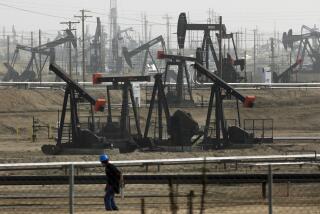Exxon Mobil profit falls a surprising 66%
- Share via
Exxon Mobil Corp. and Royal Dutch Shell, the world’s two biggest oil firms, reported sharply lower second-quarter profit Thursday, hurt by crude oil prices that are running at a little less than half of last year’s record-shattering levels.
Exxon’s profit slid to $3.95 billion, or 81 cents a share, down 66% from the second quarter of 2008 as the weak global economy hurt earnings across the company’s refining and marketing, production and chemical businesses. The oil giant said its capital spending was modestly slower than the $29-billion annual pace it had forecast earlier, attributing that to the financial limitations of its partners, the benefit of a stronger U.S. dollar earlier in the year and lower exploration costs.
“Clearly, we are in a different place in the economic cycle than we were just 12 months ago,” said Kenneth Cohen, Exxon’s vice president of public affairs.
“Our earnings over the past few years benefited from the high-commodity-price environment and robust economy . . . but the oil business is a cyclical business.”
Shell exceeded analysts’ low expectations for the second quarter, reporting a profit of $3.8 billion, a 67% drop from a year earlier. It said it received an average of $52.19 for every barrel it produced, down from $110.96 a barrel in the second quarter last year.
In addition to industrywide trends, Shell’s performance was affected by unrest in Nigeria, where attacks by insurgents in the Niger Delta cut the company’s average daily production almost in half, to 120,000 barrels from 210,000 barrels.
The Exxon and Shell results capped a week of lower earnings for the major oil companies: BP and ConocoPhillips also lacked the fat profit of last year. Profit at BP, Europe’s second-largest oil company, fell 53%. At Conoco, the third-biggest U.S. oil firm, earnings plunged 76%. Exxon said it lost $15 million during the second quarter on its downstream businesses in the United States, which includes refining and marketing of petroleum products.
Exxon Mobil shares fell about 1% Thursday, to $70.72. Shares of Royal Dutch Shell fell 9 cents, to $52.60, in New York Stock Exchange trading.
“Energy demand is weak,” Shell’s new chief executive, Peter Voser, told analysts in a conference call.
“There is excess energy-supply capacity in the world today and industry costs remain high. Conditions are likely to remain challenging for some time, and we are not banking on a quick recovery.”
Shell said it was slashing overhead. In the 30 days since taking over as chief executive, Voser has cut senior management posts by 20%, the company said. It also indicated that it would trim capital spending about 10% in 2010, but analysts at Collins Stewart, a financial advising firm, said “most of this fall should come from cost deflation rather than reduced activity.”
Both Exxon, based in Irving, Texas, and Shell, with headquarters in The Hague, are struggling to maintain or increase oil and natural-gas production in the face of natural declines in old fields. Exxon’s oil and gas output fell 3.3%, to the equivalent of 3.68 million barrels a day, though it said part of that was a result of mild weather and low natural-gas use in Europe. Shell’s output fell 5.3%, to 2.96 million barrels a day.
Both companies said they remained committed to big projects aimed at boosting their output over the next few years.
More to Read
Inside the business of entertainment
The Wide Shot brings you news, analysis and insights on everything from streaming wars to production — and what it all means for the future.
You may occasionally receive promotional content from the Los Angeles Times.










